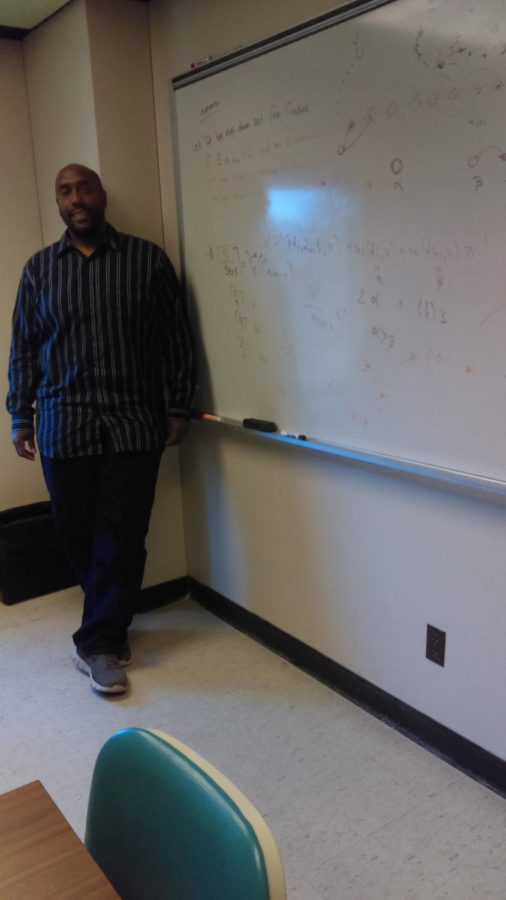Iowa State professor shines importance of equity in classrooms
Michael Young, math professor at Iowa State finds himself in Pittsburgh, Pennsylvania deeply involved in his Debt-M program when he is not in class pursuing his goal of helping others succeed in comprehending mathematics.
February 22, 2017
Professor Michael Young’s passion for mathematics began at a young age.
It led him to join a math competition that involved schools in Jacksonville, Florida, in the fourth and fifth grade.
“Me and two girls did all the mathematics for my school,” Young said.
In the second grade, Young took a standardized test and received a perfect score.
The momentum from the score on the test led to Young excelling in learning multiplication tables in the third grade.
“I remember we learned the twos and fives multiplication table, and I just got ahead of the class in terms of what we needed to do,” Young said.
Young would later attend a gifted program during the end of his elementary years.
“I was the only black student in my grade level,” Young remembered.
Young could recall a time when his teacher asked him and his classmates to bring in their baby pictures, and everyone had to attempt to correctly identify their classmates.
Young’s baby picture was the easiest to identify.
“At a very young age, I didn’t pay much attention to race.”
Being the only black student in class caused feelings of being out of place to arise, but Young found comfort in being in the new environment.
“I was scared of some of the black students,” Young said, in particular of troubled black students.
Young remembered many black students giving him a hard time with his interests in math and school.
“I think it’s a phenomenon in the black community,” Young said.
Young later attended a college prep school, which took the best students from the local area.
“Nobody never told me that I didn’t belong in the class,” Young said.
Young believed that if he had attended another school, he would not have had made any friends.
Young’s mathematical abilities were highly acknowledged during his high school years.
“I was the substitute teacher when my calculus teacher was absent,” he said.
When deciding on college, Young struggled with not having any mentors or family members to seek guidance from because many individuals he knew didn’t continue college after their first year.
Young decided to be a math major after he realized it was something he was good at.
Young chose to attend the University of Florida because it wasn’t far from Jacksonville, and many out-of-state universities didn’t give him the scholarship opportunities he sought.
The University of Florida provided him with a full-ride scholarship after qualifying for a scholarship opportunity through the Florida Lottery.
“I didn’t have any guidance to show me which school had the better math programs or better dorms,” Young said.
While involved in the University of Florida’s math program, Young was a teaching assistant for pre-calculus recitation and was involved in summer math programs.
He realized toward the end of his time at Florida that the programs and activities he was involved in weren’t necessary for him.
“They prepared me enough to go to graduate school,” Young said about his overall experience at the University of Florida.
Young believes that if he had stayed for graduate school at Florida, his path would have been different.
Young decided to attend Carnegie Mellon University, a private research college in Pittsburgh, Pennsylvania, with a much smaller enrollment compared to the University of Florida.
“The school was hard for me culturally,” Young said. “I didn’t come across people from the South. Even among the black people, I was different.”
In 2010, Young began his employment at Iowa State, and in 2013, he was approached to join the Debt-M program. The program started in Pittsburgh as a summer program for Pittsburgh public school teachers to see how math and the importance of equity in the classroom overlap.
Young explained how the program is suppose to show equity, which is where teachers learn to acknowledge that not all students learn the same, and teachers should accommodate for all students.
“One of my Ph.D. advisers started with the Debt-M and had asked me to come in as a supportive role,” Young said.
The Ph.D. adviser who introduced Young to the program soon had to step down due to personal reasons, and the program asked Young to expand his role.
He agreed and would later become the principal investigator, coordinating the mathematical problem given to the teachers during the math portion of the summer training program.
“The teachers are doing math at a higher level than you see at middle and high school levels,” Young said.
Young doesn’t see the effects of the program from Pittsburgh students, but he definitely sees changes among the teachers.
“It’ll take time for classroom and teacher changes,” Young said.
The upcoming summer will be Debt-M’s program’s last, but Young and other coordinators hope to create a similar program and expand it to multiple city school districts.
“We’re hoping of places like Chicago, New York and Florida,” Young said.
Young hopes to find people dedicated and wanting to take the initiative.
“We need communities and school districts to be supportive,” Young said.
Young believes that race has a huge impact on education, especially on students of color.
“Most of the education system in the United States is designed for white students and white men,” Young said.
Young also sees the struggle for students who don’t have parents supporting their education and don’t know how to navigate.
Young also believes that there are a lot of current policies that still encourage segregation within the education system.
“We all have different paths,” Young said. “By saying you’re color-blind, you’re not recognizing others’ hardships.”
Young believes that better understanding racism and trying to combat the ongoing issue can even improve classroom settings.
“You perform better for people you trust,” Young said.
If teachers and students connect with one another, Young believes graduation rates will improve and people will be able to obtain better-paying jobs.
Currently, Young doesn’t see any schools across the nation handling the conversations on race correctly because the issue is systematic.
“We need administration talking to us about it,” Young said. “We need them disrupting the system in an effective way.”
Young hopes that the approach will be taken in a different way in order to win the “war” society finds itself in.
“There needs to be more aggression,” he said.







